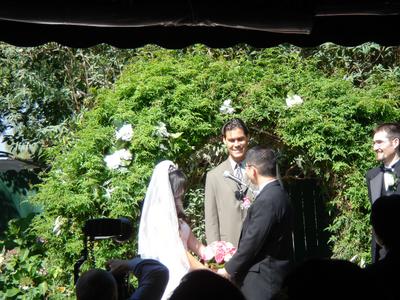I've had this conversation relating some of my reasoning with several people now and it hasn't done much more than, at best, render my audience speechless, or worse, exasperate them. By now I've had a couple of chances to think about this concept a little more precisely so I'll try to express it here.
It isn't much more than the long-standing criticism of fundamental Christianity, namely, if God is so loving, why does he send so many people to hell? Mostly what I have to offer is a rebuttal to the common defenses of this attack.
Probably the most reasonable response to this question is:
God doesn't send people to hell, He lets people choose it for themselves. C.S. Lewis argued this very point quite eloquently; probably the concept has origins even earlier than that. And, for a time this answer satisfied me. It certainly makes sense to say that God loves us so much that ultimately giving us choice is a greater expression of love than forcing his presence upon us in heaven. So in this sense hell is simply an existence apart from God.
Essentially one could characterize the debate as such:
Criticism:
God is unloving for sending so many people to hell.Defense:
Actually God is loving because he gives us the choice to choose Him or not.
Thus the responsibility has been placed on us to choose our eternal destination. And here is where I interject a rebuttal — but we didn't choose whether or not to be born.
The defense attempts to remove the judgmental characterization of God by placing the responsibility squarely on our shoulders. But a large portion of that responsibility was already decided when our parents — intentionally or otherwise — conceived us. So why should I be judged by my decisions when it wasn't my decision to even exist? If I had to choose whether to go to hell or to have never been born, I think the obvious choice would be the latter.
As an illustration, in bible studies I used to be involved in we would refer to John 12:47-48:
"As for the person who hears my words but does not keep them, I do not judge him. For I did not come to judge the world, but to save it. There is a judge for the one who rejects me and does not accept my words; that very word which I spoke will condemn him at the last day."
The illustration went something like this: Imagine you're taking a class. The teacher says, "Here is the textbook, you are responsible for chapters 1-5; there will be test in four weeks." If you choose not to study and get an 'F', is it really the teacher that is judging you? And the answer is, no, it's the textbook that is judging me; I brought this judgment upon myself because I chose not to study; the teacher didn't give me an 'F', I gave myself an 'F' because of my choices.
The corollary to my rebuttal then, is, how about the guy that decided not to enroll in the class? Why should he get an 'F' too?
The point of my rebuttal is this: there is no way of getting around the fact that God sends people to hell; at least, this defense falls short. Ultimately we are all thrown into a test we didn't sign up for but are expected to pass or fail depending on the choices we make with the circumstances handed to us.
Alternate defenses I have heard to the initial criticism are:
Hell is actually like never being born. This is a pretty decent idea. It does make for interesting interpretation of phrases like "eternal fire" (Matthew 25:41) and "eternal punishment" (Matthew 25:46, Jude :7) though. Also, as far as I know the main support of this concept is that the fire-and-brimstone concept of hell was developed later on to scare people into behaving. If you bring this up though, doesn't it lend credibility to the idea that heaven was also developed to inspire people to hope and is therefore also an imaginary concept?
People who don't [have a chance to] believe in Jesus are judged by a different standard — their consciences (Romans 2:15). This argument is quite liberal and opens up a can of worms for the typical fundamental Christian. Notably the interpretations of "Jesus answered, 'I am the way and the truth and the life. No one comes to the Father except through me'" (John 14:6) and "Salvation is found in no one else, for there is no other name under heaven given to men by which we must be saved" (Romans 4:12) are difficult to resolve.
When I was part of an organization which believed that it was going to save the world in our generation, then the concept of God sending people to hell was not so hard to swallow — at least I could say I was part of a group that was actually doing something about it. And I really believed it; there really were at the time what looked like substantial results: lives significantly changed, lots of numerical growth. In time though the superficial glory faded — numbers dwindled and life changes either regressed or were more accurately attributed to community or even hype.
So sustaining this interpretation of Scripture means believing that many, many people are go to hell, for many, many generations to come. And thus I think the criticism is valid — can a God like that really be considered loving? Or is there some other interpretation that fits reality better?
Anyway as I said, this argument didn't make it very far with my audiences so far. I am curious if this makes sense to anyone out there.



















